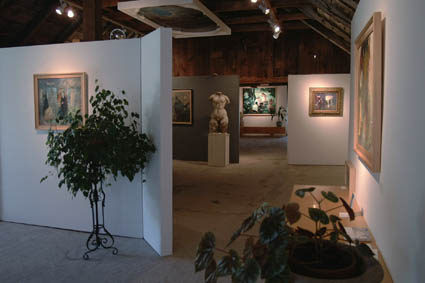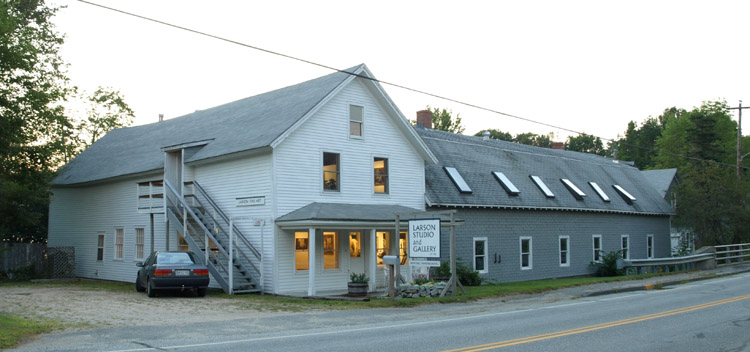The gallery in South Penobscot is now closed. To see a small selection of David Larson's work in Maine, year-round, visit:
| Lincolnville Fine Art Gallery |
2252 Atlantic Highway
Lincolnville, Maine 04849
(207) 592-9284
LARSON STUDIO AND GALLERY
 Larson Studio and Gallery circa 2001
|
The Gallery After more than 40 years living in the South Penobscot and displaying art in the gallery, the Larson family has sold the factory and moved out of the area. In recognition of the gallery space, click on this link to see an exhibition on display in 2009. To inquire about seeing David's work in person or if you have a question about his art you can phone or email his son Soren Larson at 917-921-0424 or sorenlarson@larsonfineart.com.
|
|
A history of the 'Old Canning Factory' in South Penobscot
|
| The
site of Larson Studio and Gallery, and home of David Larson and family,
is a formerly industrial
space in South Penobscot, a small town on the coast of Maine. The Penobscot
Canning Company started business in the late 30's as a cooperative venture
of the local farming community, to process and prepare their products
for a wider market. The site had hosted numerous light industries over
the years - sawmills, grist mills, even a carriage factory - by virtue
of it's downtown location, upon the banks of Winslow's Stream, a year-round
water source. This location was ideal for a canning company, as significant
quantities of water are essential to the canning process. With the closing
of the Penobscot brickyards - which had been the major industry around
Northern Bay from the 1850's through the early 1940's - the Penobscot
Canning Company became the largest employer in town in the 40's and 50's,
canning various local fruits and vegetables - sweet corn, squash, beans
and blueberries. As output grew, the factory did as well; Outbuildings,
storage sheds, even a factory store. Many of a certain age might recall
Duncan Hines Blueberry Muffin Mix© and the can of 'Wild Maine Blueberries'
the box contained; this can was one of the last products the Penobscot
Canning Company produced. Marginalized by multinational Agribusiness and
increasingly unprofitable, the company closed in 1969. David Larson and family - wife Carole, sons Adam, Soren and Anders - discovered the factory at the very end of summer vacation 1970, on their way home to Ossining, New York. Having driven past the factory for years on their way to vacationing on Little Deer Island, on this occasion David noticed a realtor's sign on the front of the building. On the next day the realtor showed them around the property, and they immediately began the process of purchasing it. A sprawling structure comprised of many different buildings constructed over time, it was still cluttered with the machinery of the canning industry. But David knew right away that it was perfect for his purpose; a place to live and create. The Larsons' first winter in Penobscot - 71'-72' - was spent in the factory store (which they came to call "The Little House"), part of the factory complex located across Town Landing Road from the factory proper. At the time the factory wasn't winterized, nor did it have the basic residential essentials of bedrooms, kitchen or bathroom. Much work would be required to make this industrial space a home. When electrical wiring and basic plumbing for bathroom and kitchen were installed in the Loft living space, the Larsons moved into the factory loft in the summer of '72. Over the course of years - making improvements has never really ceased - with the help of his sons, many fellow transplants, and a considerable crew of locals, David made the factory an ideal place to live, with spaces to create and display Art. As the factory complex had been built over time, so too would it be dismantled. A full size barn on the hill south of the factory, a garage on Town Landing Road, a boiler shed (complete with 60' smoke stack), and the Firemen's cottage (where the boiler attendant lived), were first to go; the boiler shed area became a vegetable garden. Next a large storage shed was torn down; that space became the Gallery parking lot. The Retort Room (after the removal of dozens of 4' square iron pressure cookers), Men's and Women's restrooms, and still more storage sheds came down; the resulting Patio became a place of recreation and celebration, of July 4th parties, and of quiet cocktail hours, to the soft gurgling of Winslow's Stream which ran beneath it. The wood salvaged from all these structures became the ceiling and walls of the loft living space. During the creative destruction on the perimeter, in the factory tons of machinery - conveyor belts, industrial plumbing, canning machines, and yes, thousands of cans and can tops - were dismantled and hauled off to the town dump. David started South Penobscot Woodworks with his friend and business partner Peter Yoder, an educator who migrated to Penobscot from upstate New York. Specializing in custom furniture, David and Peter set up a professional cabinetry shop on the first floor, where they built furniture, room installations and even prefab-ed parts of a house or two. His wife Carole - who had begun weaving as a hobby back in New York - entered into partnership with three principal weavers and designers - Ron King, Sheila Denny-Brown and Helen Ressler - and started North Country Textiles, which made hand woven clothing, table wares, wall hangings and other woven goods. In 1976 David and Carole opened 'Gallery' in the south building of the factory complex, displaying furniture, weaving and art on the first floor of what is today Larson Studio and Gallery. In 1984, with the second floor of the south building renovated, David opened Larson Fine Art, displaying his work exclusively. Both gallery floors were collectively renamed 'Larson Studio and Gallery' in 2002, and were open during the summer months, displaying the woven artistry of Carole and the timeless art of David H. Larson until 2013, when the property was sold to another young, creative couple. The Larson family wishes the new owners the best of luck with the site and hopes they have as much fun as they did. |
